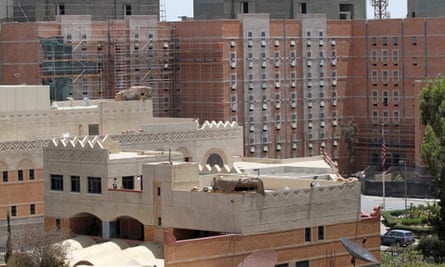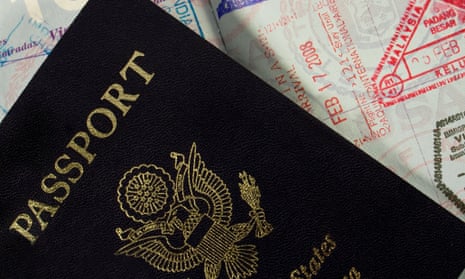In late 2012, Khaled boarded a plane in America, bound for Sana’a, the capital of Yemen. Since coming to the US at the age of 19, Khaled had worked continuously, except for a few months here and there, in various jobs, hoping to one day own his own business.
Every few years, when Khaled felt he had saved enough money, he would return to Yemen for a few weeks or months to visit family.
He did not know that this time he would be spending the next year stranded in Yemen without a passport, unable to return to his home in the US.
A few weeks into his trip, Khaled visited the American embassy in Sana’a to apply for a passport for his son. Khaled claims that he was taken into a back room and questioned. His American and his Yemeni passport were taken away from him. “They pressured and rushed me to sign a paper. I feared for the safety of my family, and felt threatened, so I surrendered my passport and signed what they wanted me to sign,” he wrote to an attorney, with the help of a translator.
Khaled is one of more than a dozen American citizens alleging they’ve have had their passports revoked for various reasons at the American embassy in Sana’a since 2012. The Guardian is identifying him by his first name only because he fears reprisals from the US government.
The reasons behind the revocations are unclear. The State Department alleges that some of the passports were issued fraudulently, sometimes claiming the individual had another name or alias before coming to the US. Campaigners say that in some cases the name in question seems to have been made up at the embassy, and in others was the result of a discrepancy rooted in a Yemeni tribal name, which is often three or four words long and is sometimes altered in the American naturalization process.
“The pattern of confiscations, all affecting Yemeni Americans, raises serious constitutional concerns,” says Yaman Salahi, a lawyer at the Asian Law Caucus.
A coalition of nine civil rights and community organizations, including the Asian Americans Advancing Justice – Asian Law Caucus and the American Civil Liberties Union in California last week submitted a report to the United States Human Rights Network. The report will then be forwarded for review by the CERD Committee at the UN in Geneva.
The report alleges that American citizens have had their passports revoked without due process; many say they have been subjected to coercive interrogations. In most of the cases documented in the report, Yemeni Americans were visiting the US embassy in Sana’a to file routine travel paperwork. Some American citizens have been stranded in Yemen for up to a year.
Fear within the Yemeni American community has made it difficult for groups to get an accurate sense of the scope of the problem. The civil rights groups claim there are over a dozen cases but probably many more; the State Department confirms that revocations have occurred, but claims that a previously cited number of 100 cases is a gross exaggeration, and will not provide numbers. A spokesperson for the Bureau of Consular Affairs said: “Passports have been returned to many individuals. In instances where an individual’s passport was revoked, the individual was notified in writing.”
Since 9/11, Yemen has been as an important US ally, and the American embassy in Sana’a has been a nexus of controversy. In September 2008, the US embassy in Sana’a was attacked by rioters. Yemen was under travel warning for American citizens from August 6 2013 until January 28 2014. The country was also home to Anwar al-Awlaki, the first American citizen to be killed by an American drone.

In May 2014, the embassy was closed for almost five weeks.
Khaled says that on the day his passport was taken from him, he was not permitted to leave the embassy until he agreed to sign a document admitting to identity fraud – which he did, and which he contests. The Guardian has obtained a copy of the statement, which is in English, and is typed on US Department of State letterhead.
“They threatened to revoke my passport and the passport of my son, and they threatened to involve me in cases of terrorism,” Khaled said.
After he left the embassy, Khaled claims its officials refused to answer his emails or phone calls. Without proof of citizenship, he did not know whether he would ever be able to return to the US, and since he was not in California to manage the business he co-owned, it eventually folded.
He was stranded. Eleven months and a day after his passport was confiscated, Khaled says he received formal notification that his passport had been revoked, and was told he could apply for a limited validity passport, which would allow him to return to the US but not leave again.
On February 8 2014, after being in Yemen for over a year, he was issued a one-time limited validity passport by the embassy. He used it to fly home to the US, but it was immediately taken from him at airport immigration.
“My citizenship held my future and allowed me access to my future. My future has been corrupted,” Khalid said in an interview with the Guardian by phone conducted via a translator.
A spokesperson for the Bureau of Consular Affairs says: “At every US embassy and consulate, we treat all applicants for consular services with dignity and respect as we strictly adhere to law and regulation.”
Typically, the State Department says, a passport can be revoked for a number of reasons, including citizenship fraud, failure to pay child support, a felony arrest warrant, a criminal court order barring departure from the United States, or a request for extradition to the United States. Passport revocation is not the same thing as denaturalization – stripping someone of citizenship – which requires a much higher burden of proof.
Once someone has been notified in writing that their passport has been revoked, they can apply for a hearing, which usually takes place at the State Department in Washington DC.
Fatima Iqbal, a lawyer at the Council on American-Islamic Relations has been representing Khaled since he contacted her organization from Yemen via email. She was part of a team of three lawyers who represented Khaled at a hearing in DC in April. Iqbal said: “The hearing was devoid of any due process. The department relied on this coerced statement almost exclusively.”
Patrick Weil, a visiting professor at Yale law school, says the State Department is acting outside its authority.
“The way the State Department was confiscating passports, arguing that this person was not legally naturalized was an abuse of power, because if they thought their was an issue over their naturalization, they should have asked the Department of Homeland Security to go to a federal court for consideration of their denaturalization. That’s the way to pursue them. The State Department has no authority to assess that a naturalization has been decided illegally,” says Weil.
On July 11, Iqbal received a letter from the State Department with a decision, saying it would be upholding the revocation of Khaled’s passport. He is not denaturalized, but Khaled is now unable to leave the country. His wife and five children remain in Yemen. “I speak to them on the phone every day. If I don’t speak to them or see them on a computer, I lose a sense of my life.”
Yaman Salahi, a lawyer at the Asian Law Caucus, says: “The people affected are generally working class, so requiring them to pay for lawyers and travel to Washington DC imposes a huge financial burden on their families.”
Salahi has filed two Freedom Of Information Act requests seeking information on the scope of the passport revocations; they are still pending.
According to the Asian Law Caucus, one individual waited 10 months and 20 days after his passport was seized at the embassy before receiving a formal letter that it had been revoked. Another waited nine months, 15 days; and a third individual, eight months, 13 days.
The American embassy in Sana’a has declined to comment. A spokesperson for the State Department said: “There is no statutory or regulatory time frame in which notification must be made. The department acts expeditiously and once that decision is reached, notification is sent in a timely manner.”
Jan Brown, an immigration lawyer in New York City who has many clients within the Yemeni American community, has seen four recent cases of passport revocation, with echoes of Khaled’s case.
Neither Brown nor his clients are in touch with any of the nine civil rights groups filing the report to the UN. He says his clients are all Yemeni American, “all male, all between 40 and 60 years old, and have all been in America for many, many years.” One of the four has had his passport returned to him; the other three cases are still open.
He describes the situation of one client: “He was interrogated, he was told he would be put on a terror list, they tried to get him to confess that passports were obtained fraudulently.”
Brown has been practicing immigration law in New York City for 36 years and says he has never encountered passport revocations before. “I’ve never seen it before at all. We’re assuming that if it has been done it’s been done sparingly or sporadically, but it’s never been done at this scale.”
His other three clients, like Khaled, were stranded in Yemen for between six and seven months before being offered limited-validity travel passports to return home.
Brown has been able to obtain a copy of one client’s voluntary statement from the State Department. Unlike Khaled’s, the statement, signed at the embassy in Sana’a, is hand-written in Arabic.
“They’re picking on people like my clients who are just people. They’re not interested in politics, they live and work and take care of their families.”
Like Iqbal, Brown has been to one DC hearing for a client. “I felt that it wasn’t completely impartial,” he said.
Asked if the individuals would be willing to speak about their experiences, he responded that they probably would not. “They are confused or traumatized.”

Comments (…)
Sign in or create your Guardian account to join the discussion